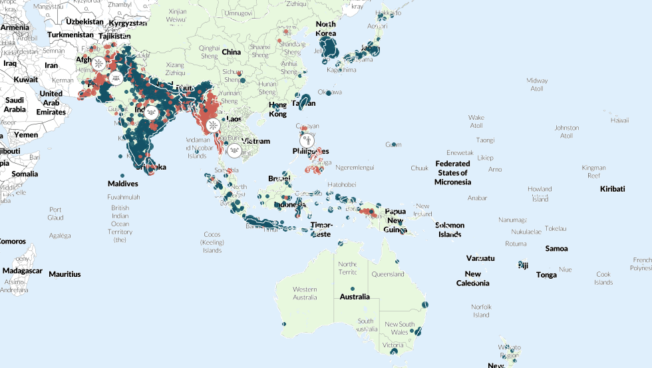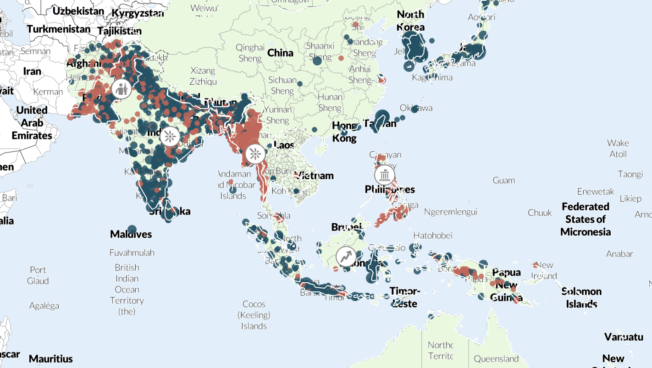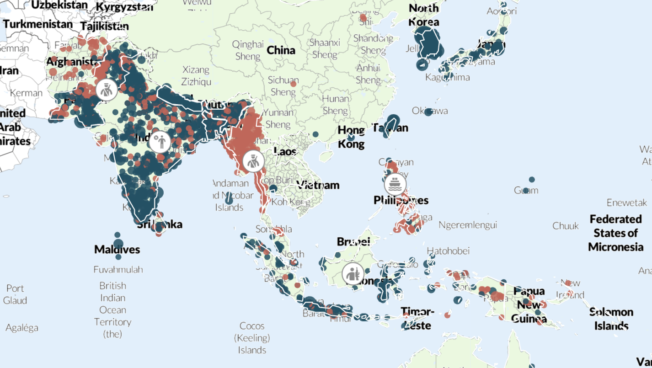Regional Overview
Asia-Pacific
June 2024
Posted: 5 July 2024
In this Regional Overview
- Afghanistan and Pakistan: Violence targeting the TTP increases amid a new nationwide operation
- India: Violence in West Bengal continues after the election
- Myanmar: Operation 1027 resumes as Haigeng agreement is broken
- Korean Peninsula: Border tensions flare following balloon campaigns
- Papua New Guinea: Turmoil in disaster-torn Enga province continued
Afghanistan and Pakistan: Violence targeting the TTP increases amid a new nationwide operation
In Afghanistan, the Pakistan Army reportedly targeted militants of the Tehreek-i-Taliban Pakistan (TTP), an Islamist group allied with the Taliban, in three separate attacks in June. The attacks reportedly killed nearly a dozen militants in Paktika, Khost, and Kunar provinces. Pakistan has been grappling with an escalation of the TTP insurgency in the northwest of the country. Clashes between TTP militants and security forces continued in June, except during a short-lived lull during Eid al-Adha festivities between 17 and 19 June. On 9 June, an improvised explosive device targeted a military truck in Khyber Pakhtunkhwa’s Lakki Marwat district, reportedly killing seven soldiers. Two days later, Pakistani forces retaliated and reportedly killed at least 11 militants. In response to heightening militant violence, Pakistan announced the launch of the nationwide Operation Azm-e-Istehkam (Resolve for Stability) on 22 June in an effort to “curtail the operational space for terrorists through regional cooperation,” among other goals.1‘Operation Azm-i-Istehkam: Govt approves reinvigorated national counter-terrorism campaign,’ Dawn (Pakistan), 22 June 2024
TTP activities have strained Pakistan’s relations with neighboring Afghanistan, which it has accused of harboring militants.2Farhan Bokhari, ‘Pakistan battles rising terror threat in Afghan border regions,’ Financial Times, 29 January 2024 The Pakistani government admitted it had carried out operations inside Afghanistan and claimed attacks would continue until the militant threat is neutralized.3Farhat Javed, “Pakistan will continue attacks in Afghanistan – minister,” BBC, 2 July 2024 In turn, the Taliban government in Kabul condemned the Pakistani strikes, describing them as a violation of its sovereignty. Meanwhile, tougher border restrictions imposed by the Pakistani government to curb smuggling prompted resistance from the local population. After months of protest sit-ins, demonstrations took a violent turn in early June in the border town of Chaman, when police arrested the sit-in leaders.4Syed Ali Shah, ‘No headway in talks with Chaman protestors,’ The Express Tribune, 16 May 2024 As demonstrators attacked government buildings, police responded with rubber bullets and tear gas, leading to scores of reported injuries among both demonstrators and security personnel.
India: Violence in West Bengal continues after the election
The 18th Indian general elections concluded in June after over six weeks of phased voting. Despite exit polls suggesting a sweeping win with a supermajority for Prime Minister Narendra Modi’s Bharatiya Janata Party (BJP), the ruling party failed to secure a majority in the Lok Sabha (national assembly) and relied on its National Democratic Alliance partners to form a coalition government. This comes after 10 years of BJP-majority rule.5Al Jazeera, ‘India’s exit polls show a majority for Modi’s BJP-led alliance in election,’ 1 June 2024; Soutik Biswas, ‘India election 2024: Why Modi failed to win outright majority,’ BBC, 4 June 2024 The announcement of the results on 4 June led to several acts of post-poll violence nationwide, with the highest share of partisan violence, 54%, recorded in West Bengal. In West Bengal, the BJP’s seat share dropped from 18 to 12, with the All India Trinamool Congress (TMC), the ruling party at the state level, winning nearly two-thirds of the total number of seats. Of the 30 violent incidents recorded in June, around 67% were between members and supporters of the BJP and TMC. Violence was concentrated around the districts of North 24 Parganas and South 24 Parganas. In one such incident, on 4 June, the BJP claimed that armed TMC members assaulted a party leader, her husband, and her mother and vandalized their house in the Canning area of South 24 Parganas district.6Subhasish Chaudhuri, Main Uddin Chisti, ‘Bengal’s post-poll violence begins: BJP, CPM workers at receiving end, blame on TMC,’ The Telegraph, 6 June 2024 Concerns over the frequency of post-election violence led the government to extend the deployment of central paramilitary forces for the elections until 19 June.7Times of India, ‘400 companies of central forces to stay in Bengal till June 19: EC official,’ 2 June 2024
For more on the unrest around the 2024 Indian elections, see ACLED’s Special Election Series on India.
Myanmar: Operation 1027 resumes as Haigeng agreement is broken
The Brotherhood Alliance pushed ahead with Operation 1027 after accusing the military of repeatedly violating the Haigen agreement, a ceasefire brokered by China in January. The Ta’ang National Liberation Army (PSLF/TNLA), a member of the Brotherhood Alliance operating largely in northern Shan state, claimed that since 9 June, the military had provoked the group with aerial attacks and artillery fire on their positions, which injured and killed some of their troops.8Irrawaddy, ‘Recurrent operations 1027 that threatened Mandalay and Pyinoolwin,’ 28 June 2024 On 25 June, the PSLF/TNLA and its allied resistance groups attacked military outposts in Nawnghkio and Kyaukme townships in northern Shan state and Mogoke township in Mandalay region, calling it ‘Operation 1027 Part II.9Myanmar Now, ‘Ceasefire between Brotherhood Alliance and Myanmar military ends in northern Shan State,’ 25 June 2024’ The combined force claimed it had captured several military outposts and key positions, including police stations and government offices, within three days. Fighting intensified as the PSLF/TNLA attempted to take control of Nawnghkio and Kyaukme towns and sever connections to Lashio town, where the military’s large Northeastern Regional Command is based. The PSLF/TNLA also targeted Mogoke town to prevent the military from transporting weapons and troops from central Myanmar. On 29 June, the Myanmar National Democratic Alliance Army (MNTJP/MNDAA), another Brotherhood Alliance member, joined the operation, echoing similar claims and attacking military outposts near Lashio town.10Radio Free Asia, ‘Kokang army and the Myanmar military clashes near Lashio town,’ 29 June 2024 The military used airstrikes and artillery during battles, killing at least 21 civilians in Kyaukme town alone.11Voice of America, ‘Battles in Kyaukme, Nawnghkio and Mogoke causing civilian deaths,’ 28 June 2024 Before the ceasefire, the military suffered several setbacks in northern Shan state, losing at least 19 towns to the Brotherhood Alliance during Operation 1027.
Korean Peninsula: Border tensions flare following balloon campaigns
In June, North Korea deployed hundreds of soldiers, including engineering and observation units, inside the Demilitarized Zone.12Choe Sang-Hun, ‘North Korea Has Lost ‘Many’ Troops to Mines in DMZ,’ New York Times, 18 June 2024 Troops are clearing vegetation, strengthening roads, and installing structures such as anti-tank barriers along the frontiers, and there are claims they entered South Korean territory on three separate occasions, with warning shots fired by South Korean soldiers.13Jessica Eberhart and Roland Shaw, ‘North Korean soldiers are building a mystery structure in the military buffer zone between the Koreas,’ The NZZ, 28 June 2024 Unidentified numbers of North Korean soldiers were killed or injured by exploding landmines while laying explosives near the border in separate incidents on 18 June.14Justin McCurry, ‘North Korea troop ‘casualties’ reported after landmine explosions in DMZ,’ The Guardian, 18 June 2024 These cross-border maneuvers occurred amid an escalation in the balloon saga between the two countries. In May, South Korean activists sent dozens of balloons filled with propaganda leaflets to North Korea, prompting the launch of over 2,000 balloons filled with refuse, including cigarettes and manure, into South Korea.15Park Eung-jin, ‘Military: “No North Korea broadcast today…will resume if filth balloons continue to be sent,”’ News1, 27 June 2024 These balloon campaigns continued for several days in June, resulting in both sides scrapping a military deal to reduce cross-border tensions and erecting new defense systems. On 6 June, South Korea suspended the 2018 inter-Korean agreement, allowing the country to resume live-fire military exercises and anti-Pyongyang loudspeaker broadcasts. On 9 June, South Korea redeployed loudspeakers, sending out K-pop music and propaganda broadcasts along the border for the first time since the agreement.
North Korea also test-fired a missile with hypersonic capabilities off its east coast on 26 June. The test came after it renewed a major defense deal with Russia on 19 June and the deployment of a US aircraft carrier on 24 June for use in a new trilateral military drill involving the US, South Korea, and Japan, which commenced on 27 June.16Hyung-jin Kim, ‘Suspected North Korean hypersonic missile exploded in flight, South Korea says,’ AP News, 26 June 2024
Papua New Guinea: Turmoil in disaster-torn Enga province continued
Enga province continued to experience turmoil despite struggling with the aftermath of a massive landslide on 24 May that reportedly killed hundreds of people. On 13 June, landslide-affected villagers from Maip Mulitaka Rural Local Level Government cut fuel lines, burned pipes, and denied access to vehicles delivering emergency fuel to the Porgera goldmine near the landslide area.17The National, ‘Mulitaka locals cut off fuel supply to mine,’ 14 June 2024 These acts came after the Porgera mine, the second-largest in the country, allegedly failed to pay royalties to villagers who own land in the area. The landowners blamed the authorities for excluding them from the recovery efforts and asked them to prioritize their relocation before reopening the road. The highway leading to the Porgera mine — which is used to deliver aid from the provincial capital of Wabag — remained blocked as of 30 June.18YouTube @EMTV Online, ‘NATIONAL EMTV NEWS | 6PM | SUNDAY 30th JUNE, 2024,’ 30 June 2024 Local authorities expressed concern that blockages would impact the delivery of basic goods, including food and medicine, into Porgera Valley.19Post-Courier, ‘Enga Provincial Government raises concerns about food shortage in Porgera Valley,’ 9 June 2024
Meanwhile, on 1 June, in Wabag district, armed men from Kompiam district raided a village and killed a Lanekep clansman who was the brother of Enga Provincial Administrator Sandis Tsaka. Tsaka appealed to his tribesmen to refrain from retaliation, which is a common practice in the area. Armed men from Kompiam district were believed to have been involved in some of the most brutal tribal fighting in the area, including the killing of at least 49 people in February 202420Antoinette Poivi, ‘Massacre in Enga,’ The National, 20 February 2024 and six people in August 2023.21Cretilda Alokaka, ‘Hired gunmen shot dead,’ The National, 22 August 2023
See More
See the Codebook and the User Guide for an overview of ACLED’s core methodology. For additional documentation, check the Knowledge Base. Region-specific methodology briefs can be accessed below.
Links:
- Methodology and Coding Decisions for Political Violence and Demonstrations in Afghanistan
- Methodology and Coding Decisions for Political Violence and Demonstrations in China and Taiwan
- Methodology and Coding Decisions for Political Violence and Demonstrations in Myanmar
- Methodology and Coding Decisions for Political Violence and Demonstrations in North Korea







